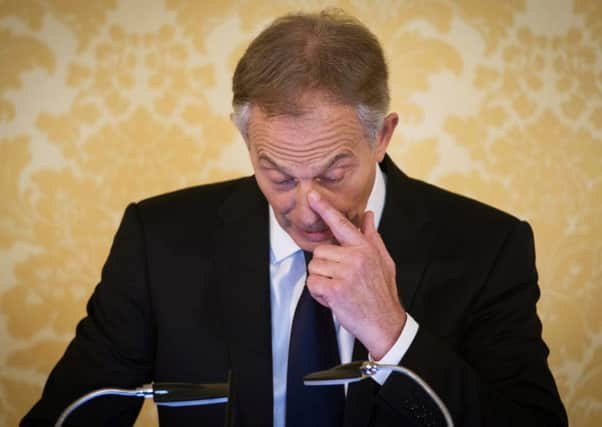Leader: Chilcot chapter is closed '“ now to learn the lessons


The biggest questions that remain are around which were the most significant failures, and who, if anyone, can and should be held accountable for them.
The report tells us that the decision to go to war was not a final resort and that there were other solutions short of an invasion that were not pursued. Going to war too soon is probably always a failure unless there is some tactical reason for the timing, some actual advantage for the troops. Mr Blair said yesterday that the US was going to war anyway in March 2003, regardess of who was with them, and that the invasion forces gathered gave a unique chance of success in action. This uniqueness was not elaborated on.
Advertisement
Hide AdAdvertisement
Hide AdThe report tells us that the intelligence assessments on which Saddam Hussein’s weapons of mass destruction capabilities were based were presented with a certainty that was not justified. Intelligence had “not established beyond doubt” that Saddam Hussein had continued to produce chemical and biological weapons, says the report. But it is known that intelligence assessments are just that; assessments – there is always going to be an element of doubt and subjective judgement. “Establishment beyond doubt” is probably not a reasonable expectation.
Crucially the inquiry found that the dossier in which Saddam’s WMD capabilities were outlined was not “sexed up” by Downing Street to make the case for war to MPs. Mr Blair also made the point yesterday that cabinet members and the leaders of the oppostion were given the same reports. He is also right to point out that Saddam’s past exploits – documented factual uses of chemical weapons with thousands of casualties – would lead to an expectation that he would be willing again to acquire them and use them.
Much has been made of whether this was an “illegal war” or not. The inquiry finds that the circumstances surroundng the decision that there was a legal basis for UK military action were “far from satisfactory”.
But the facts are that the Attorney General Lord Goldsmith advised there was on balance a secure legal basis for military action in March 2003. His view was that actions of Saddam concerning Western demands did in fact amount to non-compliance under the terms of UN resolution 1441 and therefore armed response was the agreed response. But this was only one lawyer’s view and as we all know every court case is simply lawyers giving different opinions. In some ways more significantly yesterday Mr Blair said he knew there was no time to go back to the UN because the UN was politicaly deadlocked, with Russia and France certain not to agree to military action.
So the legality is probably still up for question, but the truth is the significance of that question is probably not one of the greatest under debate. But if one believes that the ultimate, perhaps moral, authority for military intervention rested with the United Nations, hence Britain insisting to the US that the UN was involved, then Mr Blair went to war knowing that the UN was not united in backing the action and he did not have that moral authority. It must therefore be the case, as the report found, that the UK undermined the authority of the UN and it must make extremely dubious the claim the UK Government made that it was acting on behalf of the international community “to uphold the authority of the Security Council”.
Perhaps Blair’s greatest failure in judgement was his seeming willingness to back the US in whatever action it deemed necessary in Iraq. Even with Mr Blair’s explanation that his writing “with you whatever” meant that he believed this was an issue which the UK and the US would sort out together, and that to his credit he does seem to push back against Bush regarding regime change. In the end however he still judged that that relationship was so important that he did not pull out of the offensive on 18 March and let the US go it alone.
But the report identifies more crucial failures that cannot be laid solely at the door of Mr Blair, and they are perhaps the more significant failures. The first is that no politicians, either in cabinet or the oppostion, effectively held Mr Blair to account or seriously questioned the intelligence assessments or his reading of the global situation or the way he went about the process or his judgement on the relationship with the US. Given the job of politicians, that is inexcusable. Cabinet should have demanded an options paper in the run up to war.
Another inexcusable failure is that between 2003 and 2009, UK forces in Iraq faced gaps in some key capability areas – including armoured vehicles, reconnaissance and intelligence assets and helicopter support.
Advertisement
Hide AdAdvertisement
Hide AdAnother is that despite explicit warnings, the consequences of the invasion were underestimated. The planning and preparations for Iraq after Saddam Hussein were “wholly inadequate”.
The Chilcot inquiry has – eventually – brought clarity to a highly contentious part of British history. Tony Blair took the decision to go to war and it went terribly wrong, but this report cannot reasonably justify any charges of criminality to be laid at the door of the former prime minister.